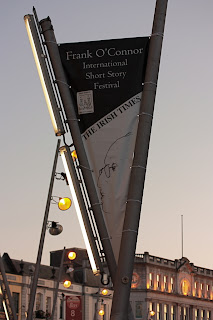 I said I wouldn't do this, but I couldn't help myself. Music and book blogger Largehearted Boy made it too easy to compile a list of short story collections that appeared on yearend lists by pulling together fairly comprehensive links to best books lists, and I've tallied the number of mentions various collections have received. (Note: I did not include three popular collections—Alice Munro's Too Much Happiness, The Stories of Lydia Davis, or My Father's Tears by John Updike. The latter two aren't eligible for The Story Prize, and we did not receive an entry for Munro, whose collection was probably mentioned in the most lists.)
I said I wouldn't do this, but I couldn't help myself. Music and book blogger Largehearted Boy made it too easy to compile a list of short story collections that appeared on yearend lists by pulling together fairly comprehensive links to best books lists, and I've tallied the number of mentions various collections have received. (Note: I did not include three popular collections—Alice Munro's Too Much Happiness, The Stories of Lydia Davis, or My Father's Tears by John Updike. The latter two aren't eligible for The Story Prize, and we did not receive an entry for Munro, whose collection was probably mentioned in the most lists.)Two short story collections showed up more times than any others by a solid margin: Wells Tower's Everything Ravaged, Everything Burned (12 votes) and Daniyal Mueenuddin's In Other Rooms, Other Wonders (9 votes). It's no surprise because these two were among the most widely reviewed. Here's the tally from most mentions to fewest:
12
Everything Ravaged, Everything Burned by
9
In Other Rooms, Other Wonders by Daniyal Mueenuddin
4
That Thing Around Your Neck by Chimamanda Ngozi Adichie
Love and Obstacles by Aleksander Hemon
Once the Shore by Paul Yoon
3
American Salvage by Bonnie Jo Campbell
Don't Cry by Mary Gaitskill
It's Beginning to Hurt by James Lasdun
Both Ways Is the Only Way I Want It by Maile Meloy
Love in Infant Monkeys by
2
A Good Fall by Ha Jin
How It Ended by Jay McInerney
Nothing Right by Antonya Nelson
Reasons for and Advanatages of Breathing by
Do Not Deny Me by Jean Thompson
1
The Heyday of the Insensitive Bastards by Robert Boswell
Elegy for Easterly by Petina Gappah
In the
Spoiled by Caitlin Macy
Going Away Shoes by Jill McCorkle
Big World by Mary Miller
What the World Will Look Like When All the Water Leaves Us by Laura van den Berg
As I said last year, The Story Prize doesn't choose its three finalists by critical consensus, and we probably read more short story collections than most of the booksellers, bloggers, or reviewers who put out yearend lists do, so we're choosing from a different and larger pool. We'll be announcing our finalists in the next ten days or so, and shortly after that our notable books. I can tell you right now that some of the 21 books on this list won't be among our finalists or on our list of other notable books. And it's also possible that we will honor collections that none of the 26 sources below named. There were a lot of excellent collections in 2009, and we hope to also shine the spotlight on some that haven't gotten enough attention.



















